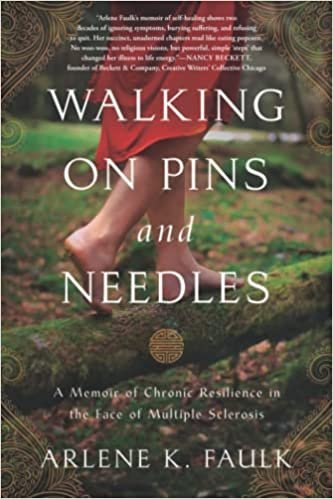Book Review: Walking on Pins and Needles: A Memoir of Chronic Resilience in the Face of Multiple Sclerosis
Walking on Pins and Needles: A Memoir of Chronic Resilience in the Face of Multiple Sclerosis. Arlene Faulk, River Grove Books, February 15, 2022, eBook and Paperback, 268 pages.
Reviewed by Lisa Lickel.
Author Arlene Faulk gives a captivating story about dealing with multiple sclerosis. She drew me into her world—from the prologue of a young woman’s dreams of leaping into a responsible career as a new adult, living independently in the exciting and challenging era of the 1970s and 80s—all the way to the final page.
Memoirs are often so personal that I feel like a voyeur, but Faulk’s engaging, frank storytelling made me part of her story, cheering, booing, and encouraging her, at times in a parental way, at various points along her journey of discovery. Perhaps because I have personal experience through friendships with this condition, Faulk’s perspective helped me take part in her life through her eyes and grow in empathy.
As a newly minted adult, Faulk experiences frightening symptoms that could have easily been attributed to hysteria had her father not been a physician and helped direct her first medical consultation. During that consultation, the neurologist spoke to her father instead of to her as they directed her tests and received a result of “inconclusive.”
She climbs the rungs on the corporate ladder in fits of strange symptoms as specific areas of her body seem to turn on and off. She copes with brain fog and extreme weakness and pain, mostly in her legs. A visit to a neurologist results in the dreaded “inconclusive” result. But this doctor asks her to track her symptoms and try steroid therapy. She joins a fitness club and makes special friends who encourage her to find a good balance in life—not easy for anyone.
Throughout the first part, Faulk reflects on her family life and future decisions while she tries to ignore the increasingly disturbing symptoms of her multiple sclerosis. Later on, through fits of doubt Faulk explores Chinese medicine and gradually regains her equilibrium, learning to re-channel and redirect her energy and pain through therapeutic manipulation, acupuncture, and eventually tai chi, the gently flowing Chinese-origin exercise regime which gives her life back.
Told without pretense, Faulk’s enlightening and fresh perspective of her personal journey of living with a dreaded chronic condition will encourage anyone, especially those who live with severe challenges. Highly recommended.

